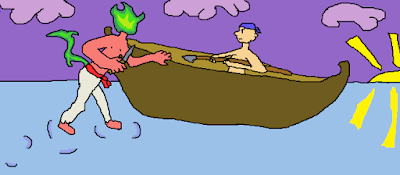The spontaneous,
off the cuff style of DMing and the 'rulings not rules' philosophy
was one of the things that really sold me on the OSR and related
games in the broader RPG hobby. I love the freedom and lack of
irritating “game mastery” mechanics, and needing to consult a
table. Playing in a game of a more rules heavy system where every
time you try to climb a rope or talk to an NPC in a basic
conversation you have to roll some stupid fucking climbing or
small-talk skill because it's there in the rulebook.
With this being
said, Rogues are in a unique place in the OSR game world. My game
features only 3 base classes; Fighters, Rogues, and Magicians. If
Fighters are good at fighting, Magicians are good at doing magic,
then Rogues should be good at the other part of this equation; Rogues
are the answer to the final cog of the dungeon-crawling gameplay
wheel.
Something that
opened my eyes about tabletop games and how you can just make it work
was the idea of nearly arbitrary roll under skill checks, there
doesn't need to be a skill on a character sheet; the DM just gives a
number and you try to roll under it to succeed. That's it. That's all
there is to a skill check. This was just so interesting to me I
started to think of how the class that's all about skill, the Rogue,
could fit.
Specialization & Backgrounds
An issue I see
with the skill check system is all about the specialization of
characters and types of skills. Under a more universal skill check
system like this, one Rogue character who grew up in the circus and
worked as a juggler and acrobat for years and another Rogue character
who picked pockets and broke into houses in a city as a youth would
both have the exact same bonuses, based on their level, to acrobatic
tumbling or picking locks and pockets.
Your first
instinct might be to give background tables or elements in character
creation. I wouldn't, for the same reason I let any Fighter be
equally capable of getting their bonus to hit and damage and bonus
attacks with all weapons if they be a pikeman from a disbanded
brigade or a wandering samurai. It's the same reason any Wizard can
cast any spell, even if they have some theme like Conjurer or
Pyromancer. Specialization hurts characters more then it helps them.
In fact, making
characters not have explicit specializations like this actually leads
to more interesting roleplay opportunities. Say your Wolf Rogue, who
lived his whole life as a bandit, started to play a slow song on a
harp to keep a hibernating she-bear from waking up and mauling him
and his looter friends to death. This becomes an immensely
interesting roleplay opportunity- how did the Wolf know how to do
that? It's a great moment, and much more appropriate to a ROLE
PLAYING game then pulling out a DC table and stating that you get a
+4 due to your background: Musician.
Challenge Rating
While letting the
DM create the chance needed on the spot based on the difficulty of
what the player is trying to accomplish, having a more ordered
structure would help if these skill checks are part of the core
gameplay. It is important that they are part
of the core gameplay, or else you're essentially denying a Rogue
player part of their characters unique toolset. It should be
mentioned that any class can attempt skill checks, and you may even
give out bonuses based on attributes, tools, or past character
experience; it's just that Rogues get a bonus.
But
what actually constitutes as a skill? What are you allowed to roll
for? I would go for a metric that doesn't involve most combat skills
or spellcasting, as well as avoiding knowledge or language based
skills. Social interactions should be covered by Reaction Checks
unless its involving a debate or trickery.
Eligible
examples for skill checks; Acrobatics, tinkering with devices,
navigating social situations, playing music or performing, sleight of
hand and more. Conveniently, these are all things the Rogue archetype
is known to do already.
There's
also the nature of 'what is possible' which could start a lot of
arguments when trying to figure what a character could try to
accomplish using this system. Personally, I would tie the amount of
'realism' I am limiting the player character by to their level. Low
level characters are more mundane where as high level ones can do
obviously supernatural feats.
Just
arbitrate a large negative malus from the roll under target number of
the skill check. For actions that seem supernatural, this can be a
negative number meaning nobody even has a chance of pulling it off.
That is unless they're a high level Rogue with a high skill check
bonus, letting them bring it into the realm of possibility.
Skill
Check Rules
When
you declare or are prompted to perform an action that requires
coordination, skill, and luck above the regular ability of your
character you will make a Skill Check. The DM will either openly
state or secretly set a target number.
Roll
d20 equal or under target number + bonuses.
Challenge
Rating Guidelines
Challenge
|
Target
|
Examples
|
| Fair | 10 < | Unlocking a standard door. Climbing over a low wall while chased. |
| Difficult | 8 to 6 | Winning a dart throwing contest. Disguise yourself without suspicion. |
| Extreme | 5 to 3 | Cut coinpurse, replace with bag of stones. Tightrope walking. |
| Monumental | 2 to 0 | Scale a sheer, slick surface. Split a fired arrow with a second one. |
| Supernatural | -2 to -6 | Lullaby that makes a beast fall asleep. Move in absolute silence. |
| Mythic | -8 etc. | Serenade a storm to calmness. Escaping the afterlife. Running on water. |




No comments:
Post a Comment